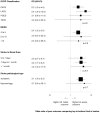Inflammatory markers and poor outcome after stroke: a prospective cohort study and systematic review of interleukin-6
- PMID: 19901973
- PMCID: PMC2730573
- DOI: 10.1371/journal.pmed.1000145
Inflammatory markers and poor outcome after stroke: a prospective cohort study and systematic review of interleukin-6
Abstract
Background: The objective of this study was to determine whether: (a) markers of acute inflammation (white cell count, glucose, interleukin-6, C-reactive protein, and fibrinogen) are associated with poor outcome after stroke and (b) the addition of markers to previously validated prognostic models improves prediction of poor outcome.
Methods and findings: We prospectively recruited patients between 2002 and 2005. Clinicians assessed patients and drew blood for inflammatory markers. Patients were followed up by postal questionnaire for poor outcome (a score of>2 on the modified Rankin Scale) and death through the General Register Office (Scotland) at 6 mo. We performed a systematic review of the literature and meta-analysis of the association between interleukin-6 and poor outcome after stroke to place our study in the context of previous research. We recruited 844 patients; mortality data were available in 844 (100%) and functional outcome in 750 (89%). After appropriate adjustment, the odds ratios for the association of markers and poor outcome (comparing the upper and the lower third) were interleukin-6, 3.1 (95% CI: 1.9-5.0); C-reactive protein, 1.9 (95% CI: 1.2-3.1); fibrinogen, 1.5 (95% CI: 1.0-2.36); white cell count, 2.1 (95% CI: 1.3-3.4); and glucose 1.3 (95% CI: 0.8-2.1). The results for interleukin-6 were similar to other studies. However, the addition of inflammatory marker levels to validated prognostic models did not materially improve model discrimination, calibration, or reclassification for prediction of poor outcome after stroke.
Conclusions: Raised levels of markers of the acute inflammatory response after stroke are associated with poor outcomes. However, the addition of these markers to a previously validated stroke prognostic model did not improve the prediction of poor outcome. Whether inflammatory markers are useful in prediction of recurrent stroke or other vascular events is a separate question, which requires further study. Please see later in the article for the Editors' Summary.
Conflict of interest statement
The authors have declared that no competing interests exist.
Figures




Comment in
-
Inflammatory markers and outcomes in cardiovascular disease.PLoS Med. 2009 Sep;6(9):e1000147. doi: 10.1371/journal.pmed.1000147. Epub 2009 Sep 8. PLoS Med. 2009. PMID: 19901972 Free PMC article.
References
-
- Whiteley W, Chong WL, Sengupta A, Sandercock P. Blood markers for the prognosis of ischemic stroke: a systematic review. Stroke. 2009;40:e380–e389. - PubMed
-
- Castillo J, Davalos A, Alvarez-Sabin J, Pumar JM, Leira R, et al. Molecular signatures of brain injury after intracerebral hemorrhage. Neurology. 2002;58:624–629. - PubMed
-
- Counsell C, Dennis M, McDowall M, Warlow C. Predicting outcome after acute and subacute stroke: development and validation of new prognostic models. Stroke. 2002;33:1041–1047. - PubMed
-
- Konig IR, Ziegler A, Bluhmki E, Hacke W, Bath PMW, et al. Predicting long-term outcome after acute ischemic stroke: a simple index works in patients from controlled clinical trials. Stroke. 2008;39:1821–1826. - PubMed
Publication types
MeSH terms
Substances
Grants and funding
LinkOut - more resources
Full Text Sources
Other Literature Sources
Medical
Research Materials

